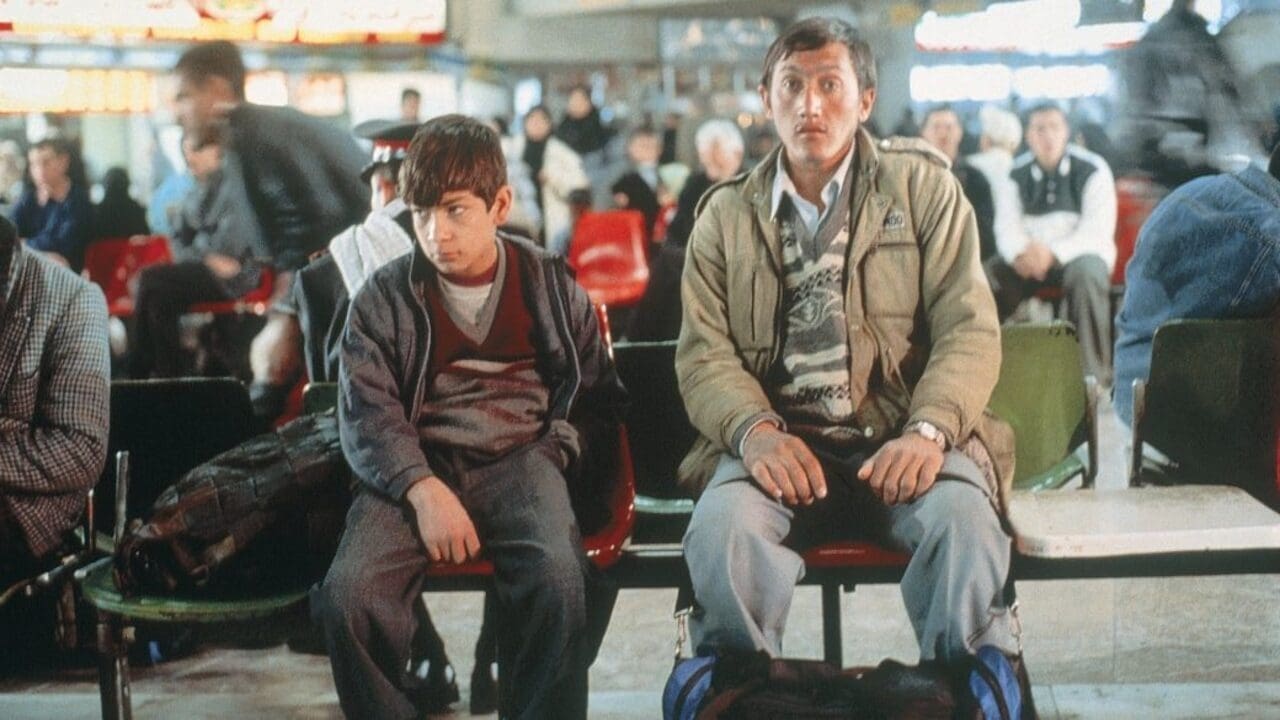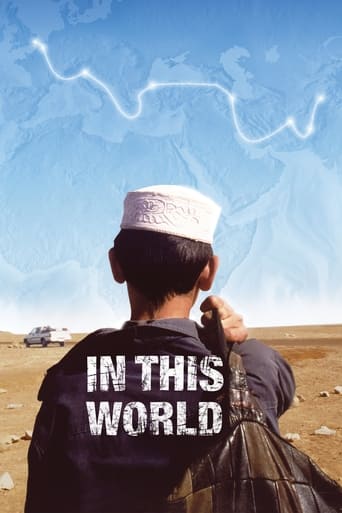RyothChatty
ridiculous rating
Smartorhypo
Highly Overrated But Still Good
Afouotos
Although it has its amusing moments, in eneral the plot does not convince.
Senteur
As somebody who had not heard any of this before, it became a curious phenomenon to sit and watch a film and slowly have the realities begin to click into place.
gelman@attglobal.net
Presented as if it were a documentary, which would lead one to believe that the cinematographer (and possibly the director), stood idly by while some of the characters died of suffocation in transit aboard a sealed trailer, "In This World" would be more effective if it acknowledged openly that this was a work of fiction based on the realities faced by Afghan refugees trying to make their way from camps in Pakistan to the West -- in this case to London. That it is fiction becomes obvious after a while since no cinematographer or director could have been present if the incidents shown on screen were real. But I resented the deception and, thereafter, disbelieved the story although it was probably true in spirit even while it was clearly not true. Sometimes truth is stranger than fiction; often fiction is more true than faked reality. As a fictional work, I would have rated "In This World" at 7.5. As a phony documentary, it is scarcely worth a 4.
Graham Greene
Over the last decade, Michael Winterbottom has emerged as perhaps the most intelligent and creative filmmaker working in Britain today. Unlike many of his contemporaries, he is unconcerned by the pressures of current cinematic trends and the importance of the Hollywood movie-system, and has instead crafted a series of visually distinctive and emotionally heartfelt films dealing with a range of subjects; from sexual jealousy, infertility, modern-day alienation, the American frontier and Manchester's vibrant post-punk music scene of the late 70's and early 80's. His best films have fused dreamlike imagery - often drawing on Bergman and Kieslowski as primary influences - with an almost-documentary-like sense of time, place and character. In This World (2002) takes that idea to new and unexplored levels, giving us a film that sets up an anti-reality that allows the film to drift in and out of the real and the surreal at any given opportunity to further establish the strained connection that the characters literally have with the world around them.The sense of space seems lifted from the work of Iranian filmmakers like Samira Makhmalbaf (The Apple, Blackboards) with the idea of heightened reality coming from the employment of non-professional actors and the general cultural background of the characters. In the opening scenes, Winterbottom offers us an anachronistic narration to give the film a further sense of reality, whilst later scenes show townsfolk and children gazing with wonderment into the camera lens. This façade of the real, which is a fictional account based on fact, is so successful that whenever a character died on screen, the people who I viewed the film with questioned whether or not Winterbottom was creating some kind of art-house snuff. The actors are drawing on real experiences and it is this particular element that gives the film its unrivalled emotional control and unbelievable sense of tragedy, with lead actors Enayatullah and, in particular, the young Jamal Udin Torabi, both offering outstanding performances.Winterbottom keeps the episodic narrative running smoothly, using the fallen innocence of Jamal as the catalyst for the film. He anchors this with the use of imagery also; hand-held digital video with jump cuts, slow motion, time-lapse, night-vision photography, and colour filters; all being used to create a dislocated atmosphere, in an attempt to make the character's surroundings both alien and threatening. It works, Winterbottom, along with his cinematographer Marcel Zyskind, create some of the most beautiful images of contemporary British cinema.In this World is a film both moving and compassionate without ever feeling the need to rely on cloying sentiment or exposition-by-numbers. Winterbottom skilfully allows the film to unfold naturally, leaving it to the central performers to create a connection with the audience. It is so refreshing to see a contemporary British filmmaker shunning the influence of Hollywood and instead looking to filmmakers like the aforementioned Samira Makhmalbaf as well as Maryiam Parvin Almani and Abbas Kiarostami, as opposed to producing lush, period costume pictures of standard thrillers. Like the works of those individuals, this is important, intelligent, imaginative and above all else, serious film-making, which should be experienced by as many people as possible.
Jugu Abraham
Michael Winterbottom, I thought, was a director worth watching (I had seen his film "Jude") but I was sorely disappointed with this film that was bestowed with a Golden Bear at the Berlin Film festival--a festival that often picks up fine cinema for its honors. I saw "In this world" at the on-going Dubai international film festival expecting to see top-notch cinema. Instead of great cinema, I saw a film that flounders in its effort to capture reality. Winterbottom and cinematographer Marcel Zyskind capture young faces and their action creditably (the young sibling who follows his brother as he leaves the refugee camp) at times and then slip up to the most shoddy camera-work soon after (local Pakistanis staring at the camera, shadows of vehicles carrying camera equipment on road sequences). The film attempts to capture fiction in a documentary style. The effort is commendable but the outcome is at best an average effort at highlighting the problem of refugees. The film begins with statements on the ration provided to refugees. A great beginning with shots of a real refugee camp. Then I was appalled to see shots of women dancers being showered with currency notes and a gruesome sacrifice/killing of an ox--sequences that add no value to the rest of the film. What is the film trying to state? Refugees are in a bad shape and they need to escape. Is Winterbottom suggesting that those who succeed are heroes and those who do not are tragic figures? Is he trying to make a statement on cultural values across borders?I feel Winterbottom could have served better purpose if he had retained the elements of documentary and discussed the problems of refugees than dramatize the journey itself. If he wanted to dramatize the journey--what are the shots of the dancing women doing here?Berlin has made a wrong choice--not that Winterbottom lacks in talent. But this is mixed-up cinema
jotix100
Michael Winterbottom's docudrama gives us a glimpse at what goes on behind the scenes when people try to emigrate to better their lives. He worked with non professional actors. It is a wonder he was able to capture so candidly the world in which the would be immigrants live and what motivates them to leave a land where no opportunities exist.The father of Enayat was naive in thinking that because his son wanted to go to London, it was going to be an easy proposition. Little did he know what Enayat and Jamal must go through before they arrive at the final destination. In a way, one wonders whatever Enayat must have thought he would encounter in London, not knowing the language, or not being as swift as Jamal turns out to be. In a way one must have to admire such determination in someone as young as these two Afghan friends. They live in a primitive society but it is obvious that they realize there is a big world out there where one can make a living with better conditions.The film becomes a road movie about all the difficulties Jamal and Enayat encounter along the way. There is also a tragedy that we were not prepared to witness, but in a lot of ways, it's a tremendous positive film, one that presents us a young man of such resolution that shows us he will be a survivor, no matter what.

